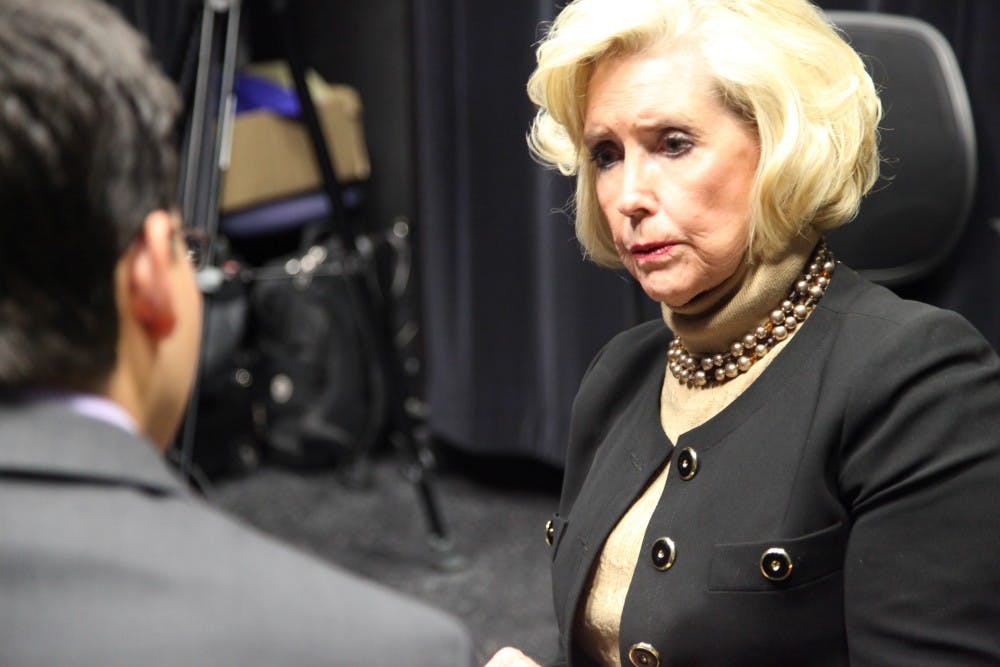The Eagle’s David Lim sat down with Lilly Ledbetter, who inspired the Lilly Ledbetter Fair Pay Act of 2009, which helps women fight for equal pay. She spoke at AU on March 18 about her personal fight to earn equal pay.
The Eagle: Compared to many countries, the U.S. does not have very many rights for maternity leave. What steps do you think the U.S. could take to match other countries that give more time off to mothers?
Lilly Ledbetter: The women of the U.S. all over are shortchanged in our pay that seems to be the only area that the other countries are in the same predicament that the U.S. is. I’ve gone to Italy, I’ve been interviewed by the Japanese, the French, in Chile and London, England. This goes on all over, unequal pay, unequal work. The other benefits that you speak of like maternity leave, off days or sickness in the family or family leave time, we are very short. A lot of the groups that fight for women’s rights are fighting for [it in] this country. We are extremely far behind with our women’s rights in this country, so far behind. That’s why I encourage young people coming out of colleges to get employment with those companies that give good benefits. There are a few of them, but they are some in this country that do. Most of the women have to do without.
E: In regards to a Minnesota bill regarding minimum wage and equal pay for women, State Rep. Andrea Kieffer said that “We are losing the respect that we so dearly want in the workplace by bringing up all these special bills for women and almost making us look like whiners.” On Wednesday, there is a continued fight for equal pay laws across the country. What are some of the next steps for equal pay legislation in the United States?
LL: That’s the problem when you have just a woman in Congress, a woman on a certain committee, just a woman at the bank. You go home and look at your local banking boards, your college boards see how many women there are. One? They have to agree with some other man in there because there are no other women. It’s just not right. We’ve never had true decisions. When my case went to the House and the Senate, there were women who stood up and talked and said that this shouldn’t be. Let me tell you about equal pay. The women in this country for the past 10 years have been locked into an average of 77 cents for every dollar that men make. It takes until January to April to make what men make in one year. And that’s if you’re white. If you’re African American or Hispanic, you’re way down the totem pole. These women need to wake up, white women haven’t even been voting 100 years, African Americans haven’t been voting as long as we have. This is not right, this is not right.
E: How would you advise college age women and men, on finding a balance between work and their personal lives?
LL: We have to have more legislation. I haven’t gotten out of the equal pay arena yet. I’m still fighting for paycheck fairness, and paycheck fairness has been around for 15-plus years, and it still has not passed. It’s gotten within two votes in the Senate. It needs 60 to carry it forward, we had 58 the last time, but they were all Democrats. If we could’ve picked up a few Republicans, we could’ve gotten it on through. If that would have been the law, I wouldn’t be here today because I would‘ve had equal pay. I was one of those aggressive employees that wanted to know how my pay stood, but I worked for a corporation that said if we discussed our pay we would not have a job. A lot of employers today insist on those same statues. We have to get more laws. One thing that I learned in my case is that your vote matters. Your voice matters.
E: How can the U.S. encourage women to work in careers that are traditionally dominated by men such as S.T.E.M. fields like engineering and computer science that may have higher pay than other fields?
LL: The one group that I do a lot of work with today is the American Association of University Women because they do have that S.T.E.M. program and they also have a Start Smart program where they train young women to negotiate when getting their jobs to get the most money possible. Bring speakers into high schools. It’s a wide open field for women who are engineers. It’s rare to hear from a woman engineer who says that they have been in the business for over thirty years. There are a lot of good jobs that women need to break into.





